HSF Mid-Year Update 2024

I am delighted to present our mid‑year update as HSF’s new Executive Director.
Over the past few months, the team has remained steadfast in advancing our mission and vision while navigating evolving landscapes both internally, with a change in staff, and externally during a challenging and unprecedented election year.
In this edition, you will find updates regarding our commitment to the protection of the rights of Zimbabwean Exemption Permit (ZEP) holders, holding our government accountable and transparent in its land redistribution policies as well as other ongoing litigation projects.
The team has also extended the reach of HSF considerably with successful contributions at events such as the Human Rights Festival in Johannesburg.
We have kept our pulse on legislative amendments and have made submissions on the White Paper on Immigration amongst others.
As we celebrate HSF’s work this year, we also recognize the importance of continuous growth and evolution. We are grateful for your continuous support in carrying on the legacy of Helen Suzman and look forward to taking you with us as we embark on this new chapter in the Foundation’s journey.
 Naseema Fakir
Naseema Fakir
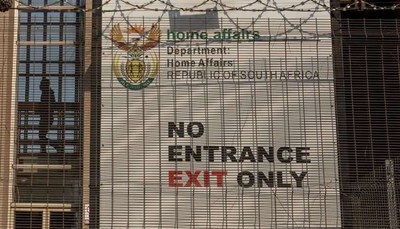 The Department of Home Affairs and HSF in the Spotlight
The Department of Home Affairs and HSF in the Spotlight
At a media briefing in April, Minister of Home Affairs, Aaron Motsoaledi (Minister) referred to foreign nationals crossing our borders as “lizards” and “crocodiles”. Such xenophobic statements are deeply concerning in their own right but in recent months, anti-migrant sentiment has manifested in two significant acts of state.
The first was the Minister’s decision to appeal HSF’s successful June 2023 High Court judgment in our long‑running ZEP litigation to the Constitutional Court. That judgment simply required the Minister to not terminate the ZEP without consulting its holders to assess how losing their permits would affect them. The second was Cabinet’s adopting as final a White Paper that promises to usher in regressive legislative reforms to South Africa’s immigration and refugee protection laws. This, without providing any analysis of what drives migration to South Africa nor any research into its effect on South African society.
HSF opposed both of these decisions. On 15 March 2024, we filed papers in the Constitutional Court opposing the Minister’s appeal, which was dismissed earlier this month, leaving the High Court’s judgment in force. When the Minister announced Cabinet’s decision to adopt the White Paper as final, HSF released a media statement condemning the decision and recirculated our January 2024 submission criticising the draft White Paper. In each of these responses, HSF emphasised just how crucial fair, sound and rational decision‑making is to a state that functions to serve all who lawfully build their lives in South Africa – citizen and non‑citizen alike.
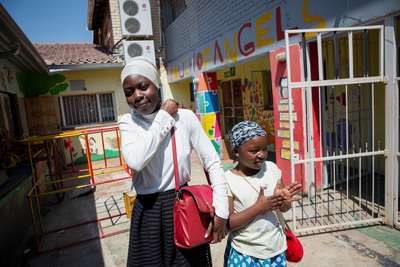 HSF Advocates for ZEP Holders
HSF Advocates for ZEP Holders
Late last year, the Minister extended the ZEP to the end of 2024 to give its holders an opportunity to apply for yet another iteration of the ZEP that will last until the end of November 2025. Yet, corporates and government departments continue to deny ZEP holders access to crucial services on the incorrect assumption that the ZEP is no longer valid. HSF has responded by writing letters for affected ZEP holders that set out the correct legal position – namely that the ZEP is perfectly valid and the Minister’s attempt to unlawfully terminate it is no reason to deprive its holders of services. HSF’s letters have been effective in securing banking services, lease renewals, vehicle registrations and in one instance, paved the way for a couple to marry. Each successful letter has represented momentous change in the day-to-day‑lives of ZEP holders and HSF looks forward to continuing this crucial work.
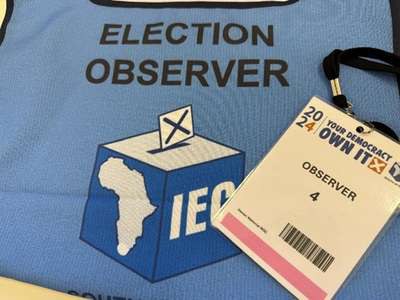 HSF Accredited Election Observers
HSF Accredited Election Observers
The Independent Electoral Commission (IEC) granted observer status to five of our staff members: Naseema Fakir, Ezekiel Kekana, Christopher Fisher, Luke Oosthuizen and Sophie Smit. Our democracy’s health begins with free and fair elections and by acting as observers, HSF showed how easy it is for ordinary citizens to observe the election process in action. In so doing, we hope to have fostered confidence in our electoral process and a general spirit of participation in key institutions of our constitutional democracy.
 HSF Joins Land Redistribution Litigation
HSF Joins Land Redistribution Litigation
In our November 2023 newsletter, HSF indicated its intention to join an application led by the Legal Resources Centre (LRC) which challenges a decision not to award a 30-year lease to a group of deserving Black farmers. HSF’s intended role in this matter is to secure an order that would help bring an end to decades-long policy uncertainty regarding how land is redistributed in South Africa. This, by compelling the Department of Agriculture, Land Reform and Rural Development (Department) to audit and make public its land distribution policy. HSF filed its application on 6 May 2024, and we are awaiting a date to be given for the hearing.
In the meantime, the LRC was forced to launch an urgent application to restore possession of the land to the farmers, after the Department unlawfully took possession of it. The LRC was successful but the Department has since failed to restore possession of the land, forcing a further application to hold the Minister of Agriculture, Rural Development and Land Reform (Minister) in contempt of court. As of 27 June 2024, the High Court has now given the Minister 30 days to comply with the order or face time in jail.
 Institutional Reform Still on HSF’s Agenda
Institutional Reform Still on HSF’s Agenda
At its annual media briefing in April, the National Prosecution Authority’s (NPA) Director of Public Prosecutions, Shamila Batohi spoke optimistically of the NPA’s journey out of the institutional “trauma” it underwent during the years of State Capture. Indeed, media coverage of the NPA often now focuses on its performance instead of its institutional health. South Africans are understandably impatiently waiting on high profile State Capture cases that end in convictions. However, sight should not be lost of the fact that reforming the NPA to mitigate against a repeat of the “trauma” of State Capture remains a priority. Indeed, institutional reform across the South African state ought to remain on civil society’s agenda. Since our last newsletter, HSF has expressed its continued commitment to advocating for institutional reform in three submissions on proposed legislation.
The National Prosecuting Act Amendment Bill
After being approved by the National Assembly, legislation has now been signed into law that makes the Investigative Directorate for Corruption (Directorate) a permanent structure within the NPA. In a submission to the NCOP, HSF welcomed efforts to make the Directorate permanent but cautioned that if it is to be a truly effective independent corruption-fighting unit, the NPA’s top leadership, under whose management the Directorate would ultimately fall, could not continue to be appointed solely by the President and the Minister of Justice. The submission was largely a repeat of one HSF sent to the National Assembly, which did not heed our call for a more independent NPA.
Public Service Amendment Bill
Government has tabled legislation that seeks to reform certain aspects of the Public Service Commission (PSC). However, those reforms stop short of giving the PSC a role in appointing high-level officials in the public service. This not only sells short the PSC’s potential to act as an independent check on the appointment powers of members of the executive, but it also goes against government’s own policy position set out in the National Framework Towards the Professionalisation of the Public Sector. As such, HSF submitted that the proposed legislation be amended to craft a role for the PSC in appointing high level personnel in the public service – in particular, members of the board and executive management of state-owned enterprises, national and provincial Directors General and municipal managers.
The General Intelligence Laws Amendment Bill
The recently introduced General Intelligence Laws Amendment Bill (GILAB) is, ostensibly, intended to comply with the directives of the Financial Action Task Force and the recommendations of the State Capture Report. However, it includes dangerously broad conceptions of national security that risk allowing the South African Intelligence Agency to vet just about any individual or institution of civil society. In a submission to the National Assembly earlier this year, HSF submitted that this broad vetting power be removed from the Bill.
 HSF Communication Training
HSF Communication Training
In February this year, HSF’s Executive Director, Naseema Fakir and researcher Ezekiel Kekana were part of an immersive four-day ‘Storytelling for Social Change’ training hosted by the Friedrich-Naumann-Stiftung Foundation, HSF’s long‑standing partner. The training was produced by The Speech Republic and saw HSF join other civil society partners in understanding the importance of effective and impactful communication.
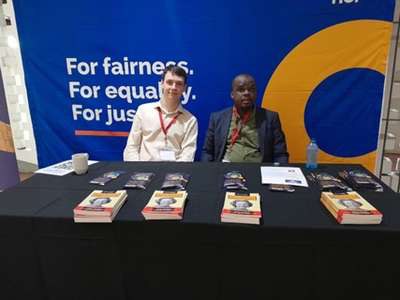 HSF Visits University Career Days
HSF Visits University Career Days
In February and March, HSF took part in career fairs at the University of Pretoria and Wits University. Our researchers, Ezekiel Kekana and Luke Oosthuizen engaged with students and shared information about career opportunities that are available at HSF for law graduates and in civil society in general. We were moved and encouraged by the knowledge of, and appreciation for, HSF’s work which many students expressed. By attending career days, HSF hopes to seek out and inspire a new generation of public interest lawyers and researchers.
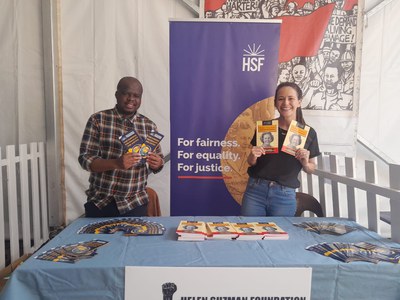 HSF at the Human Rights Festival
HSF at the Human Rights Festival
In March, HSF took part in the Human Rights Festival, which is hosted annually at Constitution Hill to commemorate those who died in bringing an end to apartheid. Over three days, HSF manned a stall, showcased our work and networked with other NGOs committed to strengthening constitutional democracy and human rights in South Africa. HSF’s Head of Research and Advocacy, Christopher Fisher took part in a panel discussion alongside the Scallabrini Centre and Lawyers for Human Rights to unpack the White Paper on immigration and refugee law reform. It was an enriching and inspiring event and HSF looks forward to participating again in the future.
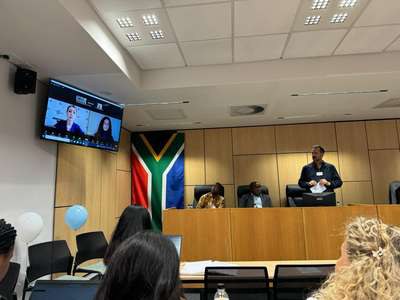 Children’s Rights and Ukraine
Children’s Rights and Ukraine
As conflicts rage around the globe, the lives of children in areas of conflict are often impacted uniquely. On 7 March, HSF researchers attended the Democracy Works Foundation’s Dialogue on International Accountability Mechanisms to Protect Children in Conflict.
There, Kateryna Rashevska and Kseniia Korniienko, from the Regional Centre for Human Rights in Ukraine, delivered a harrowing account of the abduction and deportation of many children in Ukraine by Russian forces, as well as the mechanisms used to repatriate the victims and to hold the Russian state accountable. Dr Elvis Fokala from the Centre of Human Rights, drawing on the tragic circumstances of the conflict in Gaza, spoke about the need to strengthen human rights and humanitarian law treaties in order to improve the protection of children in intensive warzones. Finally, Dr Remember Miamingi steered the discussion toward the African continent, speaking primarily about the conflicts in DRC and in Sudan. Dr Miamingi gave valuable insights on regional mechanisms such as the African Charter on the Rights and Welfare of the Child, as well as the African Court
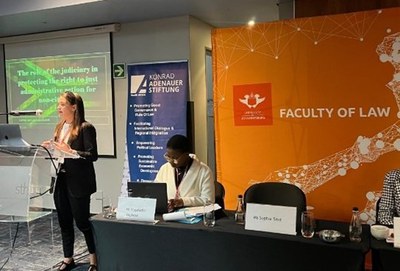 SAIFAC Conference on Democracy, Exclusion and Participation: How Can Constitutional Rights of Those Excluded From Voting Be Protected
SAIFAC Conference on Democracy, Exclusion and Participation: How Can Constitutional Rights of Those Excluded From Voting Be Protected
At the beginning of June, HSF researcher, Sophie Smit, presented her paper titled The Role Of The Judiciary In Protecting The Right To Just Administrative Action For Non-Citizens at a conference held at the University of Johannesburg by the South African Institute for Advanced Constitutional, Public, Human Rights and International Law (SAIFAC). The conference allowed for robust engagement and collaboration surrounding the difficulties that non-voters experience because of their exclusion from the electoral process. These events are always a highlight for the HSF team and present each member with a unique opportunity to present their work in a manner that allows fellow researchers to offer their own thoughts and considerations.
HSF in the Media
Media Coverage of HSF Litigation and Advocacy
HSF’s condemnation of the final White Paper on immigration reform was covered:
HSF’s opposition to the Minister’s approach to the Constitutional Court was also widely covered:
Radio
HSF Director, Naseema Fakir spoke to Radio Islam and welcomed the Supreme Court of Appeal’s decision to dismiss the Minister of Home Affairs application to appeal HSF’s successful June 2023 judgment in our ZEP litigation. Her interview can be heard here.
HSF researcher, Ezekiel Kekana spoke to MoneyWeb regarding the importance of understanding party manifestos, how best to read manifestos and reflected on why it is important for independent candidates to contest the May elections. Listen to the full interview here.

